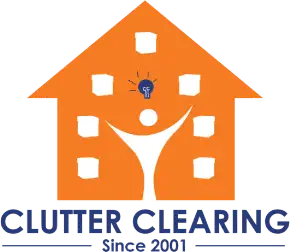Clutter Clearing Myth-Buster
Clutter Clearing Myth-Buster
YOU ‘SHOULD’ BE ABLE
TO MAKE AN INSTANT DECISION
Hands up if you’ve ever had someone help you try to declutter, and that person has pressurised you to make an instant decision? (Which of course just increases our feelings of anxiety and overwhelm).
There’s no ‘should’ and there’s no ‘instant decision’ when it comes to dealing with our clutter. We’ve tried a thousand times to make an instant decision, and our brain has ended up playing ping-pong with that decision in our head; going between what we think we ‘should’ do and what our heart is telling us to actually do, which always, always, always leads to us keeping that thing – again.
Here are 7 reasons why this myth is a myth.
1. Overwhelm
You need 2 parts of your brain to make a balanced, realistic decision in the present about the things in your clutter: the logic and reason part of your brain, and the emotional part of your brain.
When you look at something in your clutter and try to make a decision instantly, you get a rush of thoughts, feelings, memories and emotions which go to the emotional part of your brain and need to be processed before the logic and reason part of your brain can have it’s say on that decision. However, when you get more than 7 thoughts, feelings, memories and emotions, the emotional part of your brain gets overwhelmed and shuts down the logic and reason part of your brain so it can finish processing all those thoughts, feelings, memories and emotions. This means your brain won’t have access to the two parts of your brain that it needs to be able to make a decision. That’s why you can’t make an instant decision.
2. Time
How long have you had your clutter? How many times have you tried to clear it? How often have you found something you’d forgotten you even had? You need time to reconnect with all the feelings, memories and emotions connected to the things in your clutter that you’re making a decision about, before you make the final decision. That all takes time. It’s why giving yourself permission to be not sure about something is so important. When you can’t make an instant decision, all that means is your brain needs a bit more time to remember and process to the feelings, memories and emotions related to that item.
3. Trauma
Lots of things in our clutter trigger feelings, memories and emotions associated with traumatic events in our lives – stressful events that we weren’t necessarily in control of and struggled to cope with and process at the time.
For many of us we’ve buried the physical items that trigger that trauma in our clutter, as a way to avoid facing, dealing with and processing that painful or uncomfortable events or periods in our lives. When you find something in your clutter that triggers the trauma, you instantly go into overwhelm and you need time to process those feelings, memories and emotions. Many people also need the help of a therapist or counsellor to face, deal with and process that trauma in a healthy way.
You don’t deal with trauma in an instant, it takes time. That’s why you can’t make an instant decision and need the not sure category to enable you to ‘detoxify’ any clutter that triggers trauma.
4. Perfectionism
On your Journey you learn to trust and listen to your gut instinct, but that’s not the same as an instant decision. Yet people who have a clutter challenge are perfectionists. They make considered decisions, not instant decisions.
We worry that we might make the wrong decision or regret our decision. We also struggle with loss aversion, so we will often avoid making a decision at all. On our Journey we must learn that we will only know if we made the perfect decision by actually making a decision that we can get the learning and feedback from. If it turns out that we made the wrong decision, we learn from that feedback and learning so we can make a better decision next time.
5. Now and Then
When people look at something in their clutter, most are taken back to the memory of when they accumulated that thing and what they intended to do with it in the past. On your Journey you learn that we need to make decisions based on the present and our future Best Life, not our past intentions, hopes and dreams.
However, we also need time to acknowledge what we intended to with it in the past, grieve for the past in which we didn’t do what we intended to do, forgive ourselves for not doing what we intended to do, let go of the past, and then make a decision based on whether it’s part of our present or Best Life. As with everything else mentioned here, that takes time.
6. Too Few or Too Many
When people refer to making an instant decision, it’s usually based on deciding whether to ‘keep’ or ‘get rid’. Unsurprisingly, you will almost always choose ‘keep’, not only because of all the previous reasons mentioned, but because ‘keep’ and ‘get rid of’ are too few choices for your brain to make a balanced, realistic decision.
You either keep it – and have the option to use it if you need it or want to use it in the future, or get rid of it, never have the option to change your mind in the future, and you must deal with those uncomfortable emotions in the present and the fear of possible regret in the future. The safe decision is therefore to keep it.
Your brain needs enough choices that it doesn’t trigger fear, yet not so many choices that it triggers overwhelm. The comfortable number of choices for your brain is 7, and to turbo-charge your decision making, they need to be action focused choices.
7. Ripples on a Pond
The decisions we make about our clutter may not just affect us. The decisions we make now may affect friends, family or loved ones either now or in the future. We may simply need a little time to consider or consult with others before we make a confident, final decision.
You can clear your clutter fast, or you can clear your clutter forever, but you can’t clear your clutter forever, fast.
To find out how Clare can help you clear your clutter Forever, without the need for an expensive home visit, click here now: https://www.clutterclearing.net/clares-help-centre/

